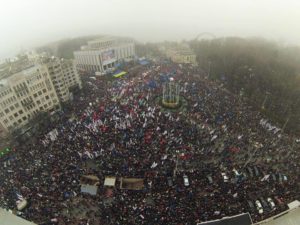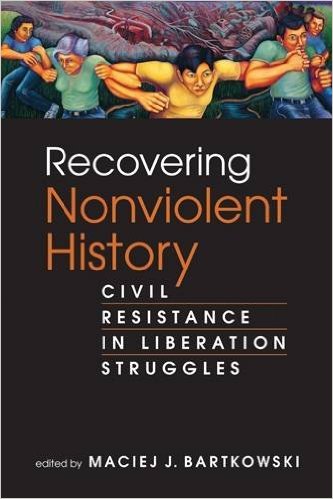 In response to my previous blog on why the Yanukovych regime fell some asked about the role of violent radicals in the movement and others made the claim that they played a significant if not a decisive role in weakening and even bringing down the regime. In the media there is also a similar theme running through the news that it were the violent radicals taht stood their ground, made Berkut or the Ukrainian interior security forces retreat and forced Yanukovych to relent. Some media even suggested that Volodymyr Parasiuk, a young activist single-handedly forced Yanukovych to run for his life. Parasiuk gave a fiery speech on the maidan just after the political opposition signed the agreement with Yanukovych on February 21 in which – in a very emotional way – he rejected the deal and gave Yanukovych an ultimatum – either he resigns by 10:00am next day or Parasiuk and others from the maidan will come after him – with arms. Yanukovych fled the Ukrainian capital on the same day the speech was given.
In response to my previous blog on why the Yanukovych regime fell some asked about the role of violent radicals in the movement and others made the claim that they played a significant if not a decisive role in weakening and even bringing down the regime. In the media there is also a similar theme running through the news that it were the violent radicals taht stood their ground, made Berkut or the Ukrainian interior security forces retreat and forced Yanukovych to relent. Some media even suggested that Volodymyr Parasiuk, a young activist single-handedly forced Yanukovych to run for his life. Parasiuk gave a fiery speech on the maidan just after the political opposition signed the agreement with Yanukovych on February 21 in which – in a very emotional way – he rejected the deal and gave Yanukovych an ultimatum – either he resigns by 10:00am next day or Parasiuk and others from the maidan will come after him – with arms. Yanukovych fled the Ukrainian capital on the same day the speech was given.
Despite the media catchy images of burning tires and flying Molotov cocktails and parading protesters in the medieval-like gears, spears and shields Yanukovych was forced out of power not because of violent protests. His regime crumbled because of the power dynamics that the masses of unarmed and organized Ukrainians stirred:
Here are a couple of reasons why violence did not bring down Yanukovych:
- A disciplined retreat by Berkut from Kyiv on the night of February 20 and throughout February 21 was not the result of the violent challenge they faced from the radicals in the movement. Under the cover of this very violence Berkut was engaged in systemic killings of the unarmed protesters – often from the safety of their snipers’ positions. The killings – the largest since the mopping operations by the Stalinist death squads of the Ukrainian nationalists after the Second World War – were the illustration of Berkut’s military capabilities used against largely unarmed people rather than the sign of its hesitation, retreat or defeat because of violent protests.
- Berkut’s withdrawal from Kyiv was initiated after Verkhovna Rada ordered it to do so in the evening of February 20. This happened even before the agreement between Yanukovych and the opposition was struck under the auspices of three foreign ministers from the EU countries. The decision of Verkhovna Rada was the result of defections of 36 members of parliament from the ruling Party of Regions who joined the opposition in passing the new law. These members of parliament shifted sides not because the actions of the radicals threatened them. They did not. Some members were deeply troubled by Yanukovych’s desire to bury Kyiv under the rubles of buildings and corpses of unarmed Ukrainians only to maintain power. Others felt the increasing heat that the conflict was taking on their own businesses. The spread of economic boycott was now reinforced by the reality of the international economic and travel sanctions that would have serious consequences for the businesses of the members of the Party of Regions.
- Since at least early January when faced with mass-based rejection of his rule Yanukovych and his allies tried to ensure the loyalty of the army by forcing the officers to sign the loyalty pledges. At the end of January the regime attempted to incorporate four elite divisions of the Ukrainian national army into interior security forces that would turn the military – whose primary mission is to protect Ukrainians against external threats – into the police that fights its own people. After apparent opposition within the military Yanukovych withdrew this plan only to have his defense minister and the newly installed, loyal to the regim,e chairman of the Joint Chief of Staff ordered on February 20 the same four elite army brigades to come to Kyiv to lead the crackdown of the maidan. The deputy chairman of the Joint Chief of Staff resigned in protest. One army brigade in Dnipropetrovsk – in one of the Yanukovych regime’s strongholds- responded to the order and mobilized the soldiers on the same day. However, more than 100 protesters went out on the railway tracks and stopped the train that carried the troops. When the troops disembarked and boarded the buses the protesters blocked the main roads in the city preventing the troops’ departure. Eventually the soldiers returned to the barracks without the attempts to shoot their way through the human blockades – which – given their firepower – they could have done easily if only they wanted. Three other brigades have never left their garrisons. If they had followed the order and have come to Kyiv the fate of maidan would have been sealed. Now, were the troops’ actions and their apparent refusal to follow the orders of the newly installed chairman of the Joint Chief of Staff the result of the violent protest? Were they concerned about engaging armed radicals? Doubtful. The issue was that the army did not perceive the movement against Yanukovych as being driven by the isolated band of extremists committed to violence but rather as being representative of the civil society at large. The army defied the orders because they saw the movement as a genuine representation of the people’s grievances expressed in a largely peaceful thus legitimate way. They saw any military action against unarmed masses of people as a high treason of the Ukrainian national interest. Therefore the army defected.
- Violent radicals were in fact also seen as poor military strategists that had little understanding about the effective armed struggle. The ‘afghan veterans’ (Ukrainians who served in Afghanistan during the war in the 1980s) that were part of the maidan self-defense units were quite aware of the ineffectiveness of violent resistance. This was the reason – as explained by the representatives of the Afghan veterans – for them not to join the violent protests and leave the square on February 18.
- Some also argue that it was protesters’ violence against the police in the second half of January that forced Yanukovych to offer concessions. The issue is that the concessions were a smoke screen and were never genuine. Even the opposition saw that clearly and therefore did not accept Yanukovych offer of the power-sharing agreement. The negotiations – one of Yanukovych apparent ‘concessions’ – that ensued after the violence flared on both side were in fact used as a cover by Yanukovych to prepare for the violent repression few weeks later.
- In strategic terms, the contribution of the Ukrainian violent radicals to the victory over Yanukovych was as insignificant as the Black Phanters’ role in the victory of the civil rights movement in the US or the armed resistance of the African National Congress forcing concessions from the apartheid regime. In each case, the opponents were neither weakened by the opposition violence nor forced to give up their power. In fact they often used violence perpetrated by the radical groups against a peaceful movement (e.g. justifying the crackdown on the activists). The repressive structures were eventually defeated by the continued nonviolent mobilization and defiance of the millions of people as it was the case in Ukraine.
There are no solid evidences whatsoever that would link protestors’ violence to Yanukovych’s departure or for that matter to the departures of many of his associates from Kyiv on February 20 and February 21. The burden of proof rests on those who argue that violence contributed to the Yanukovych downfall to substantiate their so far unsupported by facts claims.




Leave a Reply